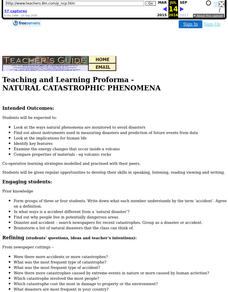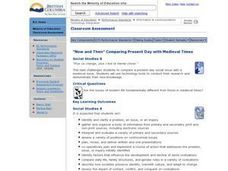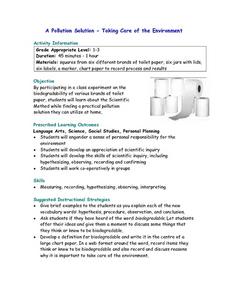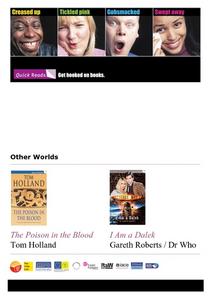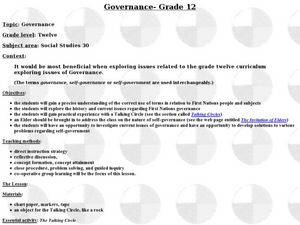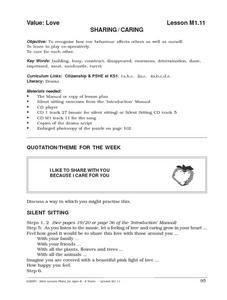Curated OER
Natural Catastrophic Phenomena
Sixth graders examine the ways natural phenomena are monitored to avoid disasters. They find out about instruments used in measuring disasters and prediction of future events from data.
Curated OER
Exploring Strategic Competency
Students practice using the English language to help them in instances where they have differing opinions. They practice paraphrasing language.
Curated OER
Nutrition for Kids...and Astronauts
Second graders, in grades 2 and 5, cooperate to create a PowerPoint presentation about nutrition and food. They have a feast culminating the project and invite parents.
Curated OER
"Now and Then" Comparing Present Day with Medieval Times
Eighth graders compare a present-day social issue with a medieval issue. They use technology tools to conduct their research and demonstrate their new knowledge. Students present their findings to the class in the form of a PowerPoint.
Curated OER
A Pollution Solution- Taking Care of the Environment
Students examine the biodegradability of different brands of toilet paper in a hands-on activity. Through this activity they also discover the steps of the Scientific Method and use new terms such as hypothesis, procedure, observation,...
Curated OER
A Relatively Far Out Idea: Estimating
Students investigate methods of estimating through cooperative group activities, hands-on activities, the use of tables and graphs and an interactive video.
Curated OER
Citizenship in Action
Eighth graders research an area of government, and plan a summer institute at the provincial level to share their findings with others. They must research the topic, decide who to invite, and what information and activities should be...
Curated OER
Life Cycle of a Butterfly/ Moth
Students explore the life cycle of butterflies, illustrate the life cycle of the butterfly, and compare the researched facts to stories written by Eric Carle about caterpillars and butterflies.
Curated OER
Chickenfeed by Minette Walters
Pupils read, analyze and discuss the novel, "Chickenfeed," by Minette Walters. They assess the theories of tell me a story, take a letter and is truth stranger than fiction? Each student reviews the synopsis and explore how dialogue can...
Curated OER
Other Worlds
Students explore the variety of 'other worlds' in fiction and their uses in reflecting our own. They explore the role of myth and
legend as the basis for modern story telling. Book extracts are provide for classroom use.
Curated OER
Governance- Grade 12
Twelfth graders discover the plight of Aboriginal people in Canada in trying to gain human rights. In this self-governance lesson, 12th graders participate in talking circles that require them to compare and contrast the visions of Prime...
Curated OER
Treaties - Grade 12
Twelfth graders explore the history and current issues facing First Nations treaties. In this native studies lesson, 12th graders research modern land claims in Canada and write reports based on their findings.
Curated OER
Now You're Speaking My Language; Deciphering the Symbols of Early Civilizations
Young scholars explore early attempts at written language. In this early civilizations lesson, students investigate first attempts at written communication. Among the civilizations covered are Mayan, Greek, and Egyptian.
Curated OER
Toxic River
Students explore environmental safety by participating in a class game. In this toxic chemicals lesson, students discuss the effect chemicals have on our environment and how to best protect against their dangers. Students participate in...
Curated OER
Sharing, caring
Students hear the story, "The Sand Castle" and answer a given set of questions. They discuss their answers and then perform a skit of the story, "The Sand Castle." Students practice and sing a new song about sharing and caring.
Curated OER
Helping
Learners awareness is raised when they are called to look after one's surrounding and have a good attitude toward helping others and working cooperatively. Students write down times of day and how that time was wasted and time helping...
Curated OER
Things to do in a city at night
Students read about things to do in a city at night and answer short questions about it. In this reading lesson plan, students also discuss what to wear, how to be safe, and how to act at a party.
Curated OER
Substance Abuse Prevention
Students evaluate the impact of substance use and abuse in society and the workplace. They identify support services in the workplace which deal with substance abuse. They create an "ideal" policy statement governing substance abuse in a w
Curated OER
ADULT ESOL LESSON PLAN--Career Advancement
Students, while examining an extensive vocabulary list on the board, explore how to request job transfers as well as work for job incentives. A graphic organizer helps to assist the students in this task before them.
Curated OER
The Trading Game
Students participate in a game in which they trade chocoloate. In groups, they discover the difficulties in trading fairly in the chocoloate business. They highlight the benefits of fair trade.
Curated OER
Fundamentalism
Eighth graders explore the historical roots of fundamentalism and determine whether fundamentalism is a religion or a political ideology. They will examine different religious fundamentalist movements around the world noting any...
Curated OER
Pageantry of the Senate
Tenth graders gain a better understanding of the historical significance of some of the procedures and traditions of the Senate. They see that the Senate in Canada is rich in traditions and pageantry.
Curated OER
So, You Think You Understand Parliamentary Democracy ?
Tenth graders experience first hand the complexity of the political process. They analyze the relationship between party policies and the political spectrum and develop an understanding of how Canada's laws are debated and passed.
Curated OER
What are Fractals?
Middle and high schoolers identify and analyze fractals and research information using the Internet to locate information about them. They look at fractals in relation to nature and other real world situations. Pupils create several...
